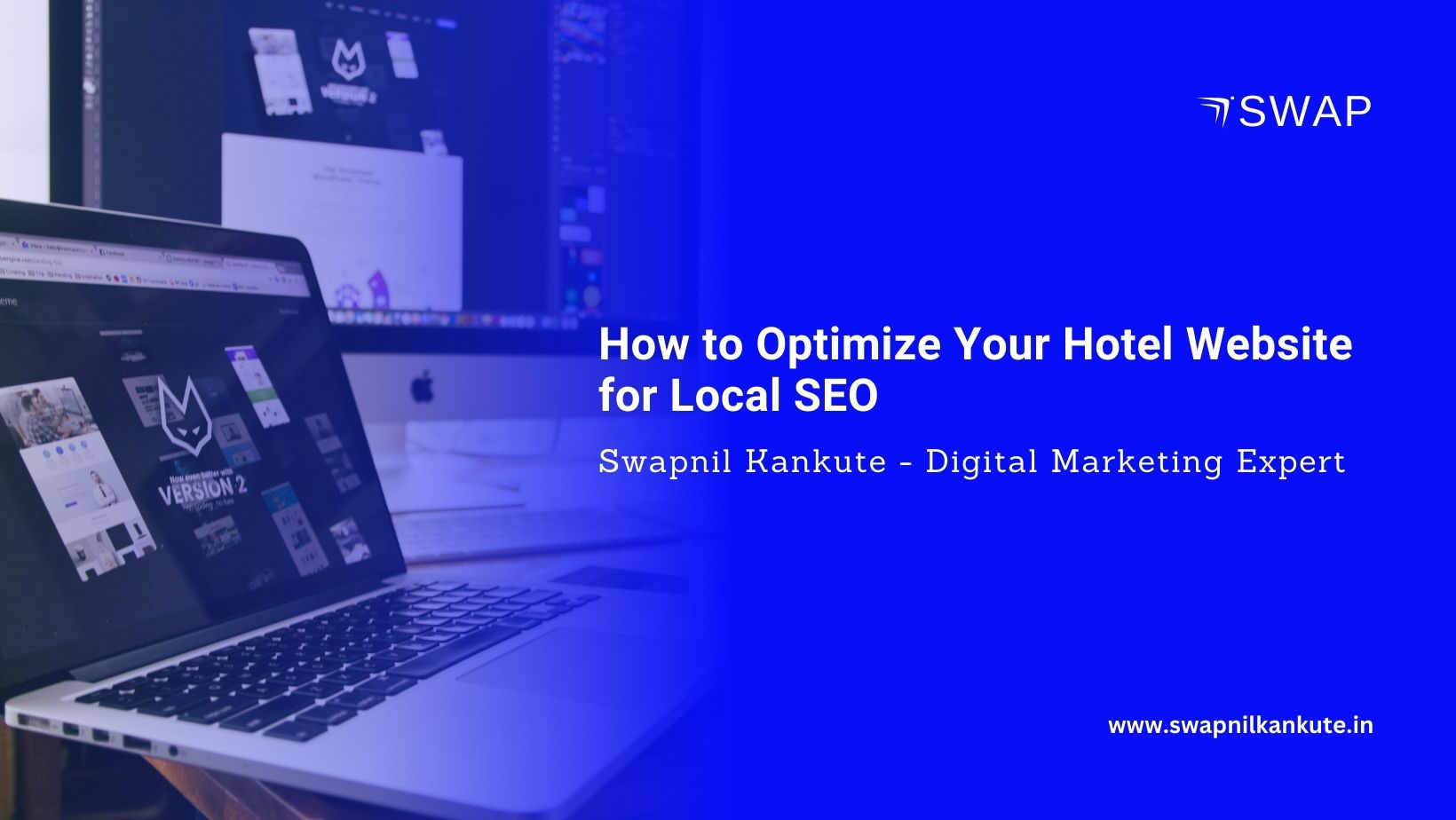In the digital age, competition in the hospitality industry is fierce. If you own or manage a hotel, optimizing your hotel website Local SEO is crucial to stay ahead and attract more guests from nearby or searching in your area. Local SEO ensures that your hotel appears in relevant search results, especially for people looking to book accommodations nearby.
In this blog, I’ll walk you through the essential strategies to optimize your hotel website Local SEO and increase visibility on search engines like Google.
Table of Contents
ToggleWhy Hotel Website Local SEO is Crucial
For hotels, Local SEO is all about getting found by people searching for accommodations near your location. Many travelers use search terms like “hotels near me,” “hotels in Chhatrapati Sambhajinagar,” or “luxury stays in [city]” when looking for places to stay.
Without effective Local SEO, your hotel could be missing out on a significant amount of organic traffic, bookings, and even foot traffic. Google’s local search results, including the Google Maps Pack, highlight businesses that are optimized for local queries, meaning you need to ensure your hotel shows up when potential guests search in your area.
1. Optimize Your Google My Business (GMB) Listing
The first step in improving Local SEO for your hotel is ensuring your Google My Business listing is accurate and fully optimized. A well-optimized GMB listing increases the chances of your hotel showing up in local search results and Google Maps.
Here’s how to optimize your GMB profile for your hotel:
- Provide Complete Information: Ensure your hotel’s name, address, phone number (NAP), website URL, and business category are all correct.
- Add High-Quality Images: Upload high-quality photos of your hotel, including rooms, amenities, and common areas, to attract guests.
- Update Business Hours: Keep your business hours up to date, including special holiday hours if applicable.
- Encourage Guest Reviews: Positive reviews are essential for ranking higher in local searches. Encourage happy guests to leave reviews on your GMB page and respond to them promptly.
______________________________
Also Read : What is Digital Marketing in the Hospitality Industry?
______________________________
2. Use Local Keywords Strategically
Keyword optimization is at the heart of Local SEO. For hotels, this means using location-based keywords throughout your website content. Start by identifying the keywords your potential guests are likely to search for.
Examples of local hotel SEO keywords:
- “Hotels in Chhatrapati Sambhajinagar”
- “Luxury hotels near [local landmark]”
- “Affordable hotels in [your city]”
- “Best hotels near [airport/station]”
Include these local keywords in key places on your website:
- Page titles
- Meta descriptions
- Header tags (H1, H2)
- Content (blog posts, room descriptions, amenities pages)
- Alt text for images
Make sure the keywords are naturally integrated and relevant to your content.
3. Create Location-Specific Content
Creating content specific to your location is another powerful way to boost your Local SEO. By providing helpful information about your city or neighborhood, you can target more local searches and improve your website’s relevance for local queries.
Ideas for location-specific content:
- Travel Guides: Create a blog or page with a guide to your city, including nearby attractions, restaurants, and activities.
- Local Events: Write about local events, festivals, or conferences happening near your hotel.
- Neighborhood Highlights: Showcase your hotel’s proximity to popular landmarks, cultural sites, and transportation hubs.
This type of content not only helps with Local SEO but also positions your hotel as a trusted source for travelers.
4. Ensure Mobile Optimization
A mobile-friendly website is crucial for Local SEO success, especially in the hospitality industry, where a large percentage of bookings are made on mobile devices. Google gives preference to mobile-friendly sites in local search results, so make sure your hotel’s website is fully responsive.
Key aspects of mobile optimization:
- Fast Loading Speed: Ensure your site loads quickly on mobile devices. Slow-loading websites lead to higher bounce rates and negatively affect your SEO ranking.
- Easy Navigation: Simplify the navigation to make it user-friendly on smaller screens. Include click-to-call buttons for easy booking.
- Optimized Images: Compress images for faster loading without sacrificing quality, and ensure that all images scale well on mobile devices.
5. Build Local Backlinks
Backlinks from local and relevant websites are a strong ranking factor in Local SEO. For hotels, building backlinks from local businesses, tourism boards, and travel blogs can help boost your site’s authority in local searches.
Here’s how to build local backlinks:
- Collaborate with Local Businesses: Partner with local attractions, restaurants, and tour operators to get featured on their websites.
- Submit to Local Directories: Ensure your hotel is listed in local directories like TripAdvisor, Yelp, and Booking.com.
- Guest Blogging: Write guest posts on local travel blogs or tourism websites, linking back to your hotel website.
6. Use Schema Markup for Local SEO
Schema markup is a type of structured data that helps search engines better understand your website’s content. For hotels, using LocalBusiness schema or Hotel schema can improve the way your hotel appears in search results.
Benefits of schema markup for hotels:
- It makes your contact details, reviews, and business information more visible to search engines.
- It can improve your hotel’s visibility in local searches by providing search engines with the necessary data to showcase your hotel effectively.
Use structured data to display information like:
- Hotel address and contact information
- Reviews and ratings
- Room availability and booking options
7. Optimize for Voice Search
As voice search continues to grow, optimizing your website for voice queries is essential for Local SEO. Many voice searches are location-based, and travelers often ask questions like, “Where is the best hotel near me?” or “Find hotels in Chhatrapati Sambhajinagar.”
Tips for optimizing for voice search:
- Use conversational language in your content that mirrors how people speak.
- Answer specific questions in your blog posts and FAQs, like “What are the best places to stay near [landmark]?”
- Incorporate long-tail keywords that people are likely to use when speaking into voice search devices.
8. Monitor and Analyze Local SEO Performance
Once you’ve implemented these Local SEO strategies, it’s important to track and monitor your results. Use tools like Google Analytics, Google Search Console, and Google My Business Insights to measure how well your website is performing in local search.
Keep an eye on metrics like:
- Local search rankings
- Traffic from local search queries
- GMB listing views and actions
- Mobile traffic performance
This data will help you understand what’s working and where you need to make adjustments to improve your hotel’s Local SEO performance.
Conclusion
Optimizing your hotel’s website for Local SEO is key to attracting more guests and increasing bookings from local searches. By focusing on strategies like optimizing your GMB profile, using local keywords, creating location-specific content, and ensuring mobile optimization, your hotel can rank higher in local search results and stand out from competitors.
If you need expert guidance on how to improve your hotel’s Local SEO, feel free to reach out to me, Swapnil Kankute, a Certified Digital Marketing Expert for Hospitality industry with years of experience in optimizing websites for the hospitality industry.
Boost your hotel’s online presence and attract more guests with professional Local SEO strategies. Contact Swapnil Kankute today for personalized digital marketing solutions tailored to the hospitality industry!



